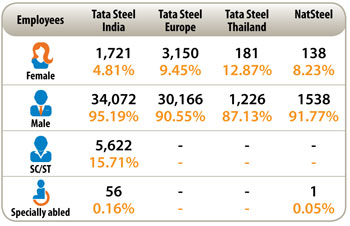 |
Since its inception, Tata Steel has always viewed its people as its greatest asset. Measures taken by the Company became a part of modern India's laws and a part of the Conventions of the International Labour Organisation. The Company endeavours to be an 'Employer of Choice' by fostering an environment of aspirational goal setting, continuous improvement, in addition to health and safety, and corporate responsibility.
|
Right to freedom of association and collective bargaining
Tata Steel respects the right of employees to exercise freedom of association and collective bargaining. Trade unions are present and encouraged at all locations. All non-officers (~86% of the total workforce) in India are represented by 26 independent trade unions across the Company's locations. Challenges faced are discussed with the recognised unions at scheduled meetings.
Joint Consultations: Established in 1956, the three-tiered Joint Consultation System provides a platform for issues related to production, productivity, quality, safety, welfare, training, (excluding issues of collective bargaining and individual grievances). Grievance Handling Mechanism: The Company has an informal, online grievance resolution process called 'Samadhan', and a three-tier formal grievance resolution mechanism. Unresolved grievances are referred to the Central Works Committee. In Financial Year 2011-12, the Committee addressed six grievances, of which two were resolved to the satisfaction of the employees concerned.
|
Equal opportunity employer
Tata Steel recognises and values the differences in employee 'backgrounds and skills' and promotes equal access to employment and supply opportunities without discrimination. Any alleged violation of the equal
opportunity policies is investigated and, if found valid, acted upon.
|
Promoting a just and fair workplace
The level of wages and salaries of all employees - except, for instance, the senior managers in Europe, skilled employees of NatSteel and the officers category in India are defined and determined by periodic collective bargaining or wage arrangements. The Company complies strictly with rules and regulations stipulated by local governments on minimum wages paid to employees.
|
|
Encouraging work-life balance for employees
A unique initiative, launched in Financial Year 2010-11, Wellness@Workplace continued to be rolled out across locations in Financial Year 2011-12.

As on 31st March, 2012
Some other employee initiatives cover aspects related to housing, medical care, education, culture and counselling. Specific initiatives for female employees include:
Additional 15 days leave for those with children below five years. Additional house points that allow them to create a nurturing environment for their children. Relaxation in eligibility clauses for sabbatical on maternity grounds. Promotion of the women empowerment cell of Tata Steel.
|
|
Caring for the well-being of its employees, including those with special needs
Committees comprising representatives of the Union and Management jointly monitor employee benefits. The following benefits are provided beyond statutory obligations:
Workplace amenities superior to those prescribed by law; highly subsidised and quality canteen facilities; employee health provisions; monetary incentives for higher studies; family benefit scheme; TISCO Employees' Pension Scheme, in which the Company and employee make an equal contribution towards the fund; maternity leave provisions; Early Separation Scheme for non-officers of the Company who have been rendered surplus.
|
|
Providing a safe, hygienic and humane workplace
The Safety Excellence Journey enables the Company to continuously improve Occupational Health and Safety management using internationally recognised standards. The Safety Excellence Journey was launched in Tata Steel Thailand in 2010 with support from Tata Steel India.
|
|
Safety Governance Structure
The Management is responsible for training and supervising employees on safe procedures and health
care, providing information on safety hazards and providing safety appliances. It is also responsible for the Company's compliance with statutory provisions on health and safety. The Company constantly strives to achieve its goals of a Zero Fatality rate, and a Lost Time due to Injury Frequency Rate (LTIFR) of 0.4.
|
 |
|
Skill development and creating world-class employees
The Tata Steel Management Development Centre (TMDC) creates managerial and functional training opportunities for all officers of Tata Steel India, while the Shavak Nanavati Technical Institute (SNTI) is responsible for technical and functional training of officers and non-officers.
In April 2011, the Tata Steel Academy was launched in Europe to enable employees to achieve the highest standards of technical and professional expertise. During Financial Year 2011-12, NatSteel invested a total of 18,432.9 man-hours in training.
|
|
Offering a harassment-free workplace to all
Tata Steel aims to have a discrimination-free workplace. Guidance on a harassment-free workplace is taken from the Tata Code of Conduct and the Company's Human Resource, Sexual Harassment and Affirmative Action Policies.

Health check-ups, NatSteel
|